In this article, I’ll give you 20 great guitar tips for beginners that will get you quickly moving in the right direction and on your way to being a great guitar player!
Learning how to play guitar is a great skill to have, both for personal enjoyment and for the more practical aspects. For example, you might learn how to play guitar to accompany yourself as you sing or as a way to make money busking on the street.
Even if you don’t know any songs yet, you can still practice chords and scales and build up your technique. Here are some tips to help you get started!
You can use the table of contents below to take you to the area that interests you. Click on the little box to open it and then click on the section of the article you want to read, or you can read from start to finish if you want the full learning experience!
Why It’s Important To Develop Good Playing Habits

Before you begin reading my tips for learning guitar, I want to emphasize the importance of playing correctly.
Many beginner guitar players make the mistake of not learning good playing habits from the beginning.
You should try to develop good playing habits from the beginning so that you don’t have to deal with bad habits later in your guitar playing. This means practicing and taking care of your instrument correctly, making sure you’re playing with a metronome and using proper technique when you’re just starting.
If you learn how to play with good technique from the start, it will be easier for you to start playing songs that are more difficult than what beginner guitar players usually learn how to play.
Quick Start Checklist

Here is a quick summary of how beginning guitar players should learn to play the guitar.
This is what I have found to work best. Feel free to use your own checklist.
Choose The Right Guitar
Choosing the right guitar can make all the difference between success and failure.
Use Thin Gauge Strings
Strings that are too thick or too high above the frets can hurt your fingers.
Find Your Special Place To Play
Choose a play to play that makes you feel comfortable and is free from interruptions.
Keep Your Guitar Where You Will See It
Put your guitar in a safe place, but somewhere that is convenient to play.
Get A Guitar Tuner
Never play your guitar without properly tuning it!
Hold the Guitar Correctly
Learning to hold your guitar correctly will help you develop good playing techniques.
Use A Metronome
Using a metronome whenever you practice is key to learning how to play in time with the song!
Create A Practice Schedule
A practice schedule is the best way to keep you organized and moving in the right direction.
Develop Calluses On Your Fingers
Finger calluses will allow you to play longer without discomfort.
Learn Some Simple Chords
Learning a few chords that are easy to play is one of the best ways to get started!
Improve Your Technique With Exercises
There are many exercises you can do early on to improve your playing.
Practice, Practice, Practice!
Consistency is the secret to success!
Keep Practice Sessions Short And Fun
Always keep it fun and learn to stop when you’ve had enough. Tomorrow’s another day!
Take Breaks When You Play
Take breaks during each practice session to make things easier to handle.
Avoid Looking At Your Hands
Learning to play without looking at your hands will help you read music.
Learn How To Read TAB Or Sheet Music
Learning to read music will significantly speed up the learning process.
Practice Training Your Ear
Ear training will give you the ability to compose music and play what you hear.
Use The Visualization Technique
“Visualization” is a very powerful tool to give you the confidence to try new things.
Get Help From Others
Don’t be afraid to ask for help from other guitar players and teachers.
Join The Band
One of the best ways to improve your playing is to join a band!
Keep On Reading To Learn More About Each Topic
Tip 1 – Choose The Right Guitar

The first thing you’ll need is a guitar. Beginning players should choose an easy to play and reasonably priced guitar. This might be the most daunting aspect of learning to play guitar because there are many different types of guitars to choose from.
For example, there are acoustic and electric guitars. Acoustic guitars can be classical or folk (Spanish) guitars. I find that electric guitars are easier for beginners to learn on because they can be adjusted to suit the player’s needs. Consider getting an electric guitar, even if you want to be an acoustic player. You can trade it in for an acoustic guitar later on.
See When To Buy Your Second Guitar? (With Buyer’s Guide) for more info.
Tip 2 – Use Thin Gauge Strings
You might feel more comfortable with thinner strings when you’re first starting. This is because thicker strings require a greater force to be played correctly. Thinner (lighter gauge) strings are easier to fret and thus a good choice for beginners.
No matter what type of guitar you choose, it’s essential to ensure the strings are appropriate for your skill level. For an electric guitar, begin with .009 gauge (thickness) strings and set them low enough to the top of the frets, so they are easy to push down but don’t buzz.
Use light gauge strings on acoustic guitars. Folk (Spanish) guitars should have steel strings, and classical guitars should have nylon strings. Nylon strings are easier on the fingers than steel strings, especially if you have not developed calluses.
Putting steel strings on a classical guitar will permanently damage the instrument!
Tip 3 – Find Your Special Place To Play
It’s essential to find a place to play without bothering anyone or being interrupted. If you live in an apartment, this might mean practicing in the basement or your bedroom when everyone else is gone for the day. You could also try playing outside on your porch or in a nearby park.
Your practice space should be comfortable, well-lit, and have photos, posters, plants, scented candles, or whatever will make it special for you. If you have an extra room, then you can turn this into your music studio., you
Tip 4 – Keep Your Guitar Where You Will See It
Keeping your guitar in plain sight will make you more likely to pick it up and practice. If you put the guitar in a closet or the back of your room, the chances are that you’ll forget about it. And if you don’t practice, your guitar won’t get any better!
I keep guitars all around the house, so I can pick one up if I have a few free minutes or while I’m watching TV. Most of my guitars are in my music studio, where I do my daily structured practice sessions.
Tip 5 – Get A Guitar Tuner
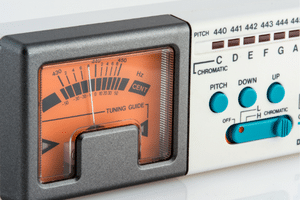
The first thing you should do is to get a guitar tuner. This will make it much easier to tune your guitar and ensure it sounds good. Never play your guitar without properly tuning it.
A poorly tuned guitar won’t sound or play right, and you will become discouraged as you move through the learning process. A well-tuned guitar is essential to developing a good musical ear.
Buy a cheap digital guitar tuner and keep it with your guitar everywhere you go. Alternately, you can use a free tuning app on your smartphone or online.
Tip 6 – Hold The Guitar Correctly
You need to be sure you’re holding your guitar properly. There are a few ways to hold the guitar, so it’s best to experiment and find the one that’s most comfortable for you. Learn how to play both sitting and standing.
It’s easier to play sitting when you first begin. Sit straight up in a comfortable chair with both feet on the floor. If you play standing up, get a guitar strap and adjust it to a height that puts the guitar in a comfortable playing position for both the right and left hands.
If you learn a tune sitting down but want to play it with others in a band standing up, you also need to practice it standing. The two playing positions are very different experiences!
Tip 7 – Use A Metronome
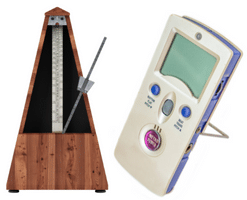
The metronome is a device that helps you keep time in music. Beginners often have a hard time playing accurately in time, so the metronome is important. When you practice with a metronome, you will learn to synchronize your rhythm to the song you are playing.
It might seem like a small thing, but keeping proper time when strumming chords and playing melodies will help your playing sound much better! You can find free metronomes online, use an app on your smartphone, or you can purchase a metronome from a local music store.
When you get comfortable using a metronome, you will be able to keep time when you play simply by tapping your foot. I mostly use my foot to keep time but always use a metronome when learning a complex piece or trying to play something very fast with excellent precision.
Tip 8 – Create A Practice Schedule
One of the essential aspects of mastering anything is consistency. This is true for playing guitar as well! Please sit down and create a practice schedule and follow it. You can even set alarms on your phone to remind you to practice. You’ll be amazed at how quickly you’ll advance with this method!
Be sure to space out your practice sessions to practice at least 15 minutes per day. If you are just starting and have not built up calluses on your fingers, begin with a 5-minute session three times a day.
If you are not following a preset lesson plan, spread out your practice techniques throughout the week. Work on learning chords one day, playing scales and arpeggios the next day, ear training the following day, etc.
Tip 9 – Develop Calluses On Your Fingers
If you’re not used to playing guitar, your fingers will probably become sore during and after you practice. This is because the skin on your fingers is not used to being pressed down onto the strings.
You can avoid this by practicing for a little bit each day and allowing your fingers the time they need to develop calluses. This will make learning to play guitar much easier as your fingers become accustomed to the process.
Stop and take a break when your fingers become sore. Music is not supposed to be a painful experience! It will take several days or even a week before you start to see results.
Tip 10 – Learn Some Simple Chords
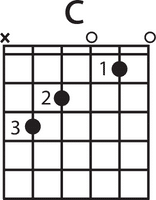
When you start playing guitar, it’s important to know some of the most common chords. A chord is a group of notes that are played together at the same time. The simple chords usually have three or four notes to finger and some open notes. You can use these chords to play many songs, so it’s a good idea to learn them now.
A few simple chords you should know are A, D, E, G, and C. These Major chords can be used in many different songs! After you learn these, you can tackle the F chord, which requires holding down two notes with one finger. Add some dominant chords like D7 and G7. Don’t be afraid to throw in some minor chords, like E minor and A minor.
Tip 11 – Improve Your Technique With Exercises
It can be challenging to perfect your various playing techniques when you first start the guitar. This is where exercises come in! There are many exercises you can do to help improve your technique.
For example, learn the names of the stings and then the names of the notes in the first three frets of each string. As you gain confidence and experience, you can learn the names of the notes higher up the neck. Eventually, this will allow you to play chords and melodies in different areas (positions) up and down the fretboard.
Tip 12 – Practice, Practice, Practice!
When you first start to learn guitar, the best advice is to practice, practice, practice! It may seem like a lot of work at first, but it will pay off in the end.
Apply everything you learn to play actual songs! After all, that’s the point of learning all the technical stuff. You can learn other people’s songs or write your own. Eventually, you will know enough songs to entertain your family and friends or play in a band.
If you want to learn how to play guitar on your own, there are many resources on the internet that can teach you. If you want some help with your technique or have questions about anything, feel free to ask someone who plays. You can find a guitar teacher online or from a local academy.
Some people never learn anything technical. They learn on their own and become excellent players
Practicing chords and scales is also a fantastic idea. If you ever wanted to play something more complicated than what’s taught in beginner classes or books, then you’ll have a strong foundation from which to build on. Try practicing chords first to get an idea of how they feel under your fingers before moving on to scales.
Tip 13 – Keep Practice Sessions Short And Fun

One of the most common mistakes people make when learning to play guitar is that they try to do too much in one practice session. This leads to frustration and boredom, which can cause you to lose interest in playing altogether. It’s better to keep sessions short and fun so that you don’t get overwhelmed!
Start with 5 minutes a day and then move up to 15 minutes a day in 5-minute increments. Add additional practice time in 15-minute increments, and remember to take short breaks every 15 to 30 minutes.
Everyone wants to be able to play their favorite songs the minute they get started, but that takes time. You might not be able to play songs just yet, but that doesn’t mean you can’t have fun with it!
Try to copy small parts of a song by ear, like a chord progression or part of a guitar solo. It’s a lot of fun to play along with a recording, and you’ll be amazed at how much you can learn!
Tip 14 – Take Breaks When You Play
It’s important to take breaks when you’re playing guitar. You might feel like you want to keep practicing, but if you push yourself too hard without any breaks, you’ll just be making things worse for yourself. Your fingers and hands will get tense, and it will become difficult to play. You can take a break by playing something different or just relaxing for a few minutes with some quiet music.
Another way to take a break is to stop practicing altogether and return to it later in the day or the evening. You will find yourself refreshed and eager to get back to giving it another try!
Tip 15 – Avoid Looking At Your Hands
As you become more comfortable playing notes and chords on the guitar, try to play them without looking at your hands. This will take a while, but the more you do it, the easier it will become.
This allows you to concentrate on locking in your timing more precisely for both chords and melody. It will become an indispensable skill if you learn to read TAB or traditional sheet music.
Practice playing without looking at your hands in both the sitting and standing positions. It’s generally harder to look at your hands when standing. I used to play guitar in a very dimly-lit room when I was first learning to get out of the habit of looking at my fretting hand.
Once you master playing without looking, playing the guitar will feel much more natural and like an extension of what’s happening in your mind.
Tip 16 – Learn How To Read TAB Or Sheet Music
It’s important to know how to read TAB (tablature) or traditional sheet music because it gives you access to what others have written. The most straightforward approach is to begin with TAB, which is very intuitive and easy to understand. There are many online TAB sites to find hundreds of songs in every genre.
Traditional sheet music is more challenging to learn but will help you learn the song’s rhythm, harmony, and melody more precisely than tab.
The best approach is to combine TAB and traditional sheet music, especially if you are playing higher up on the guitar neck since TAB will show you exactly where to place your fingers on the fretboard.
The better you can play without looking at your hands, the easier it will be to read music. Conversely, the better you get at reading music in higher areas (positions) of the neck, the easier it will get to play without looking, so they both work together to help you become a better player!
For more info, see Best Guitar TAB Sites – What No One Is Talking About!
Tip 17 – Practice Training Your Ear
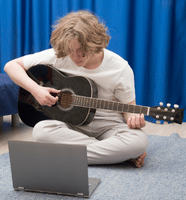
One of the most important skills you can learn about playing guitar is how to train your ear. When you start playing the guitar, you will want to listen closely to what it sounds like when a note is played.
You will notice some notes sound higher or lower than others, and you will want to focus on the unique “color” that each note has, for example, how an A note sounds different than an E note.
Train your ear to recognize what notes sound good together in chords (harmony) and single note patterns (melody). Try different combinations of notes until you get them to sound right. Learning the guitar parts from recorded music is fun and one of the best ways to train your ear.
As you become more advanced in your ear training, you can begin to learn about relative and absolute (perfect) pitch concepts.
Tip 18 – Use The Visualization Technique
One of the most important aspects of playing the guitar is visualization. For example, you need to learn how to think ahead to visualize the guitar strings and anticipate when you will need to press down each string to play a note or a chord.
You can start by thinking about what fingers you’ll be using, and then you should practice moving your fingers in time with your brain’s internal rhythmic clock.
After you learn the basics, visualization is a powerful tool that can give you the confidence to learn a new technique or a complex piece of music that you think is beyond your capability. For more info, see the section on visualization in How To Relax When Playing Guitar – 8 Best Tips And Tricks!
Tip 19 – Get Help From Others
Learning to play any instrument can be challenging, and it’s essential to make sure you know what you’re doing. Luckily there are tons of online resources available for guitar players, as well as people who will be happy to help! You might find that a teacher is the best option before using the internet and other resources like videos and tutorials.
Getting together with family members and friends who play the guitar can be a very educational experience in a relaxed and enjoyable atmosphere!
As you learn from others and improve, don’t be afraid to “give back” by passing your knowledge off to others that can learn from you. Teaching something is one of the best ways to solidify the concept in your brain!
Tip 20 – Join The Band

You may not know anything about music, but that’s okay! That’s what bandmates are for. When you’re just starting, it can be helpful to find some people who are more experienced than you and work on your problem areas with them. You’ll learn things very quickly by watching your friends play the guitar.
Don’t be afraid to play with people better than you. I started playing in a rhythm and blues band with musicians ten years old than me when I was in middle school. They taught me an incredible amount about all aspects of music!
As you progress on the instrument, it gets easier to teach yourself new things on your own. But when you first start playing, it can be hard to figure out what chords go where. Watching someone else play will give you a good idea of how chords are played in different contexts and how they sound together.
Playing in a band, even if it’s in someone’s garage, will give your existence as a musician meaning and give you a lot more confidence to call yourself a “guitar player!”
Advantages Of Playing Different Styles Of Music

The first thing you should do is figure out what styles of music you’re interested in playing. This will help you decide what chords and scales to learn first.
When learning guitar, it’s important to be versatile. There are many different styles of music you can learn to play on the guitar, like pop, jazz, rock, blues, and folk. A good guitarist should be able to play many different styles of music to be a well-rounded musician.
Another advantage of playing different styles of music is that it helps you develop your skills in other areas. For example, if you only played rock and roll, you might develop your rhythm and lead playing abilities on the fingerboard, but if you practice jazz or classical, you might focus more on your fingerpicking skills.
Or maybe you’re interested in non-western music like flamenco or Arabic music. You’ll need to determine what types of strings they use and how the tuning works.
Depending on your goals, you might want to focus more on one type of music than another. For example, if you plan to make money busking, you will probably want to stick with one of the simpler styles of music like folk or country.
There are no boundaries to what you can learn. You can learn folk, blues, classical, jazz, metal, pop, reggae, and more! It’s all up to you.
Can Someone Be Too Young To Play The Guitar?

Not really! I have seen children of all ages become acquainted with the guitar! Even letting a baby hold a toy guitar can generate interest in the instrument as the child grows older.
Many guitar manufacturers make smaller size “scaled-down” acoustic and electric guitars to fit children’s hands. They are generally reasonably priced and can be handed down to others as the child grows and requires an adult-sized instrument.
What Age Is Too Old To Learn To Play The Guitar?

The short answer is that you’re never too old to learn, especially if you like music! Playing the guitar is one of the best hobbies you can take up after you retire. It’s “good for what ails you,” and playing music is a wonderful pastime!
Playing the guitar can enrich your life by connecting you with various other musicians that you can perform with. Many senior centers and senior living facilities feature wonderful bands comprised of musicians of that age group.
For more info, see Learning Guitar For Seniors – Make Each Day Great With Music.
Disadvantages Of Not Being Open To various Types Of Music

One downside to not being open to different types of music is the possibility that you might miss out on some great opportunities. For example, in a world where everyone is listening to rap and hip-hop, you might miss out on some good rock and roll if you don’t explore your other options and think outside the box.
When learning a new instrument, you must keep an open mind when listening to new genres of music. You’ll be amazed at the things you can learn. If you’ve never listened to a musical genre before, give it a try! You might find some songs that you really enjoy and others that don’t hold your attention as much.
Listen to some fabulous guitarists who can play anything, like Eric Johnson or Steve Morse. You can hear elements of rock, blues, country, jazz, and classical in their playing. They took something from all these musical genres and fused them together to create their own unique style!
Beware Of Distractions!

It’s easy to get distracted, especially when you are beginning to play guitar and busy with your job, family matters, or other hobbies that you enjoy doing!
Organization and commitment is the key to making progress on the guitar. You have to play consistently every day and learn to move out of your comfort zone.
It’s important to have a set time and space to practice guitar to avoid getting distracted by other activities. One common pitfall is to watch TV or a movie while you’re “practicing.”
This huge distraction takes your attention away from the task at hand. It’s ok to “noodle around” on the guitar while you relax and watch some tube but recognize the fact that this won’t take the place of your dedicated practice session.
Is Learning From Online Videos And Apps Legit?
Yes. You can learn to play guitar from online videos and apps, and it can be an efficient way to get started. However, you need to be wary of videos that seem too good to be true. There are many free lessons on YouTube, but not every lesson is the same. Some tutorials are more helpful than others, and some will even teach you bad habits that you’ll have a hard time breaking later on.
Online Videos
There’s a lot to think about when looking for a video tutorial or app, so here are a few things to keep in mind:
- Make sure the person in the video is playing what they’re talking about – don’t watch someone talk about something they have no idea how to do themselves!
- Read reviews before watching anything – look for people who say they made progress with the video after seeing it and look for patterns between people who love or hate a certain video series by seeing what others say in their reviews
- Watch short videos that demonstrate a principle from different angles – if possible, watch from multiple angles so you can see how the fingers move when playing chords and scales.
- Make sure the video has good sound quality – if it sounds like someone is speaking with a mouth full of marbles or you can’t understand what is being played, it’s probably not worth your your time and trouble!
A better option to watching random YouTube videos is subscribing to one of the many guitar instruction websites.
Trurefire
Truefire is a good place for beginners to learn how to play guitar. It has lessons for both acoustic and electric guitars and bass guitar. Truefire provides tutorials on scales, chords, exercises, and more. The interface is easy to use, and the app itself functions smoothly. Truefire offers different types of subscriptions, too – you can pay monthly or yearly for individual or family memberships.
Justin Guitar
Justin Guitar provides guitar lessons for beginners, songs to learn, and the ability to share your playing online with others. You can also sort through songs by difficulty level to find a good starting point for your skill level.
It has a ton of free lessons and videos that cover every topic you need to know to start playing. The site also has video tabs to help you see how different chords and scales are played.
Guitar Tricks
The guitar tricks helps you learn how to play the guitar. It offers over 500 chords, 500 scales, and 500 songs. The lessons are broken into different categories, so it’s easy for players to find what they’re looking for.
And while the app does cost money upfront (rather than charging per lesson), users can try out the free demo before deciding. It offers you a series of videos to guide you through various techniques and exercises that will help improve your playing.
You can also find tutorials on playing over specific chords and soloing over various chord progressions.
Lick Library
Lick Library is a website that sells video tutorials to help you learn how to play guitar and specific songs. The site also sells instructional books and DVDs. There are hundreds of licks on the site, along with videos of each lick played slowly and then up to speed by a professional guitarist for beginners to learn from.
If you want to see exactly how to play all the parts of a song, then this site might be for you. The chord progressions and solos that are taught are essentially dead-accurate, note by note!
Online Learning Apps
There are many online learning apps to choose from. Two of the most popular are Fender Play and Yousician.
Fender Play
Fender Play offers lessons in guitar, bass, drums, and vocals. It’s a pretty cool service. It can be on the expensive side, but it’s cheaper than private one on one lessons.
It’s not the same as a teacher looking over your shoulder, but it can be a great supplement! You can get access to video lessons and songs that will help you figure out how to play the guitar. The lessons are available inside the app or as video tutorials on YouTube.
There are various levels of difficulty, depending on your level of experience. All the instructors have something valuable to show you in each lesson.
Yousician
The Yousician app is a great way to learn guitar. The app is designed for beginner to advanced guitarists and has a ton of lessons and exercises to help you learn how to play the instrument.
Yousician starts with simple chords and exercises and allows you to play along using TAB, standard notation, or both. Everything gets progressively more difficult as you improve.
There are some downsides. For example, there’s no video component for each lesson. If you’re struggling with a particular exercise or song, it may be hard to figure out what you’re doing wrong without watching someone else perform it in front of you. Another downside is that it can get pricey.
Although there is a free version, your daily practice time is limited, which might be ok when you are first beginning and not spending a lot of time playing the guitar.
Frequently Asked Questions

Here are some of the questions that people ask when considering learning to play the guitar or as beginning students.
If you have additional questions, leave them in the comment section of this article, and I’ll get right back to you with an answer!
What Do I Need To Start Playing The Guitar?
All you really need is a guitar, a guitar tuner, and a plan to begin learning. If you buy an electric guitar, you don’t need an amplifier right away. You can learn from a family member, friend, instructional book, online, or with an instructor.
What Are The First Songs I Should Learn To Play On Guitar?
Learn songs that have easy chords, a straightforward melody, and a tempo that is not too fast. If you sing, you can accompany yourself by playing chords in the background. It’s important to begin learning songs that you enjoy playing.
Is There An Easy Way To Learn Barre Chords?
Start with “partial” barre chords that do not require you to barre all six strings at once. For example, you can learn an “F” chord with a partial barre that requires only the top two strings to be barred using the index finger. Before learning barre chords, you should be able to play all the common open chords.
What Are Power Chords?
Power chords use only the root (1st note and octave notes) and the 5th note of the chord. They don’t include the chord’s third or flat third, so they are not major or minor chords. They are commonly used in rock or metal songs and played with overdrive or distortion to give them a “powerful” sound.
Final Thoughts

I hope you found these 20 guitar tips for beginners a valuable aid to getting you started. They are all that you need to keep you moving in the right direction and allow you to become the player you want to be.
The guitar is a fantastic instrument that anyone can play. It requires the proper guidance, time, and patience to learn, but once you get the hang of it, you’ll be able to make some beautiful music. As you begin learning the guitar, it’s essential to keep the following things in mind.
- Don’t be afraid to ask for help when you need it.
- Practice is important.
- Start with the basics, and work your way up from there!
- If you feel discouraged, take a break and come back to it later.
- Write down what you learn- taking good notes will help you remember everything better.
- Keep your guitar in great shape so that it sounds its best.
- Be patient and have fun!
You can never be too young or too old to begin learning how to play the guitar, so what are you waiting for? Get started today!

Related Article ➡ Is A Jazzmaster Good For Beginners? – What You Need To Know!
What To Read Next ➡ How To Remember Guitar String Names
Related Article ➡ Is Playing A Guitar A Talent Or Skill? – Secrets To Success!
Tell Me What You Think
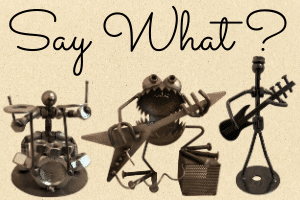
Please leave a comment below if you enjoyed this article, have any questions about these tips for beginner guitar players, or want to give your point of view. I will be happy to help you.
- If you were thinking about playing the guitar, did this article convince you to give it a go?
- If you are already a beginning student, did you find these tips helpful?
- As a beginning player, what are your strengths and weaknesses?
- Would you find an article on electric guitar tips for beginners helpful? Acoustic guitar tips for beginners?



Hi Frank, I like all your tips, especially not looking at the hands while playing! I did not think about it and kept looking at my hands while playing. It is super hard for me to not look as I am a completely new beginner, but reading through your notes, I agree that I need to try to steer away from that!
Thanks a lot,
Grace
Hi, Grace
Thank You for your comments!
DON”T worry too much about looking at your hands when you play, especially if you are a new learner! The way to approach this is to simply be aware that it’s a goal to perfect down the road. Think of it as a work in progress.
Once you learn how to play something like a chord or melody really well, you can practice playing it without looking at your hands. When you are learning something new, it’s OK to look at your hands. After all, you want to be sure you’re playing it correctly!
The main benefits of not looking at your hands are that it frees you to think of other things, like timing, and focuses you more on listening to what’s going on around you, like what other band members are playing, etc.
As a completely new beginner, one of the prime objectives is to keep learning new things while having fun!
Keep on playing! 🎸
Frank
Great article for beginners.
I have played guitar for around 15 years now, and I never had someone teaching me; I learned ‘my own way.’ Now it is much easier to learn to play guitar by yourself than it was back then. There is a lot of information on the internet that is very useful. I totally agree on never playing the guitar without tuning it. It is really important not only to train the fingers but also to train the ears!
Hi, Johnny
Thank You for your comments!
I am thrilled that you thought this article has value for beginners! I am also a self-taught player. It’s good to be able to play by ear and read music, so I do a mixture of both.
There is a tremendous amount of information on the Internet to help people learn to play the guitar, some good and some not so great.
The two things I always recommend students get are a guitar tuner and a metronome!
Keep on playing! 🎸
Frank
I loved that you mentioned that exercises are perfect for improving technique. My son is begging me to let him take guitar lessons, and I think it would be good for him. I’ll have to look online to find a private teacher in our area.
Hi, Eve
Thanks so much for your comments!
Private music lessons are still the best way to learn how to play the guitar most effectively. If your son wants to play that badly, then he will end up becoming a great guitar player! ?
Rock On! ?
Frank ?